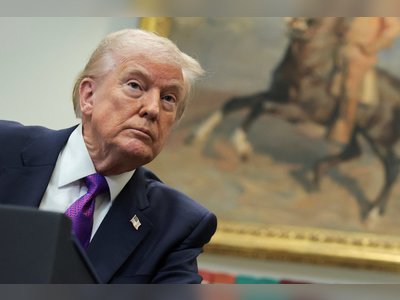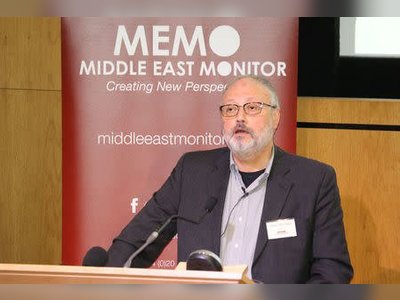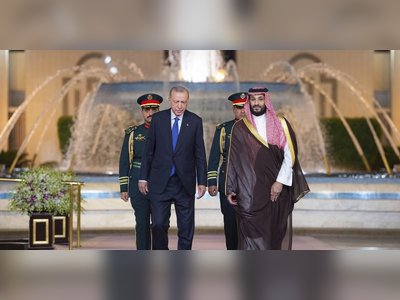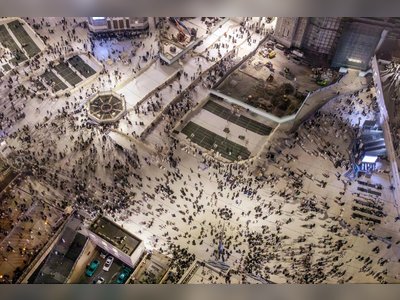
Last minute objections threaten historic UN climate deal
A last minute fight over emissions cutting and the overall climate change goal is delaying a potentially historic deal that would create a fund for compensating poor nations that are victims of extreme weather worsened by rich countries’ carbon pollution.
“We are extremely on overtime. There were some good spirits earlier today. I think more people are more frustrated about the lack of progress,” Norwegian climate change minister Espen Barth Eide told The Associated Press. He said it came down to getting tougher on fossil fuel emissions and retaining the goal of limiting warming to 1.5 degrees Celsius (2.7 degrees Fahrenheit) since pre-industrial times as was agreed in last year’s climate summit in Glasgow.
“Some of us are trying to say that we actually have to keep global warming under 1.5 degrees and that requires some action. We have to reduce our use of fossil fuels, for instance,” Eide said. “But there’s a very strong fossil fuel lobby ... trying to block any language that we produce. So that’s quite clear.”
Several cabinet ministers from across the globe told the AP earlier Saturday that agreement was reached on a fund for what negotiators call loss and damage. It would be a big win for poorer nations which have long called for cash — sometimes viewed as reparations — because they are often the victims of climate disasters despite having contributed little to the pollution that heats up the globe.
However, the other issues are seemingly delaying any action. A meeting to approve an overall agreement has been pushed back more than two-and-a-half hours with little sign of diplomats getting together for a formal plenary to approve something. Eide said he had no idea when that would be.
The loss and damage deal was a high point earlier in the day.
“This is how a 30-year-old journey of ours has finally, we hope, found fruition today,” said Pakistan Climate Minister Sherry Rehman, who often took the lead for the world’s poorest nations. One-third of her nation was submerged this summer by a devastating flood and she and other officials used the motto: “What went on in Pakistan will not stay in Pakistan.”
The United States, which in the past has been reluctant to even talk about the issue of loss and damage, “is working to sign on,” said an official close to negotiations.
If an agreement is accepted it still needs to be approved in a unanimous decision late into Saturday evening. But other parts of a deal, outlined in a package of proposals put out earlier in the day by the Egyptian chairs of the talks, are still being hammered out as negotiators head into what they hope is their final session.
There was strong concern among both developed and developing countries about proposals on cutting greenhouse gas emissions, known as mitigation. Officials said the language put forward by Egypt backtracked on some of the commitments made in Glasgow aimed at keeping alive the target of limiting global warming to 1.5 degrees Celsius (2.7 Fahrenheit) since pre-industrial times. The world has already warmed 1.1 degrees Celsius (2 degrees Fahrenheit) since the mid 19th century.
Some of the Egyptian language on mitigation seemingly reverted to the 2015 Paris agreement, which was before scientists knew how crucial the 1.5 degree threshold was and heavily mentioned a weaker 2-degree Celsius (3.6 degrees Fahrenheit) goal, which is why scientists and Europeans are afraid of backtracking, said climate scientist Maarten van Aalst of the Red Cross Red Crescent Climate Centre.
Ireland’s Minister for the Environment Eamon Ryan said: “We need to get a deal on 1.5 degrees. We need strong wording on mitigation and that’s what we’re going to push.”
Still, the attention centered around the compensation fund, which has also been called a justice issue.
“There is an agreement on loss and damage,” Maldives Environment Minister Aminath Shauna told the AP early Saturday afternoon after a meeting with other delegations. “That means for countries like ours we will have the mosaic of solutions that we have been advocating for.”
New Zealand Climate Minister James Shaw said both the poor countries that would get the money and the rich ones that would give it are on board with the proposed deal.
It’s a reflection of what can be done when the poorest nations remain unified, said Alex Scott, a climate diplomacy expert at the think tank E3G.
“I think this is huge to have governments coming together to actually work out at least the first step of ... how to deal with the issue of loss and damage,” Scott said. But like all climate financials, it is one thing to create a fund, it’s another to get money flowing in and out, she said. The developed world still has not kept its 2009 pledge to spend $100 billion a year in other climate aid — designed to help poor nations develop green energy and adapt to future warming.
“The draft decision on loss and damage finance offers hope to the vulnerable people that they will get help to recover from climate disasters and rebuild their lives,” said Harjeet Singh, head of global political strategy at Climate Action Network International.
The Chinese lead negotiator would not comment on a possible deal. European negotiators said they were ready to back the deal but declined to say so publicly until the entire package was approved.
The Egyptian presidency, which had been under criticism by all sides, proposed a new loss and damage deal Saturday afternoon and within a couple hours an agreement was struck but Norway’s climate and environment minister Espen Barth Eide said it was not so much the Egyptians but countries working together.
According to the latest draft, the fund would initially draw on contributions from developed countries and other private and public sources such as international financial institutions. While major emerging economies such as China would not initially be required to contribute, that option remains on the table and will be negotiated over the coming years. This is a key demand by the European Union and the United States, who argue that China and other large polluters currently classified as developing countries have the financial clout and responsibility to pay their way.
The planned fund would be largely aimed at the most vulnerable nations, though there would be room for middle-income countries that are severely battered by climate disasters to get aid.
An overarching decision that sums up the outcomes of the climate talks doesn’t include India’s call to phase down oil and natural gas, in addition to last year’s agreement to wean the world from “unabated” coal.
Several rich and developing nations called Saturday for a last-minute push to step up emissions cuts, warning that the outcome barely builds on what was agreed in Glasgow last year.
It also doesn’t require developing countries such as China and India to submit any new targets before 2030. Experts say these are needed to achieve the more ambitious 1.5 degrees Celsius goal that would prevent some of the more extreme effects of climate change.
Throughout the climate summit, the American, Chinese, Indian and Saudi Arabian delegations have kept a low public profile, while European, African, Pakistan and small island nations have been more vocal.
Many of the more than 40,000 attendees have left town, and workers started packing up the vast pavilions in the sprawling conference zone.
U.N. climate meetings have evolved over the years to resemble trade fairs, with many countries and industry groups setting up booths and displays for meetings and panel discussions.
At many stands, chairs were stacked neatly ready for removal, and monitors had been taken away, leaving cables dangling from walls. Pamphlets and booklets were strewn across tables and floors. Snack bars, which the Egyptian organizers said would remain open through the weekend, were emptied out.
At the youth pavilion, a gathering spot for young activists, a pile of handwritten postcards from children to negotiators was left on a table.
“Dear COP27 negotiators,” read one card. “Keep fighting for a good planet.”
“Some of us are trying to say that we actually have to keep global warming under 1.5 degrees and that requires some action. We have to reduce our use of fossil fuels, for instance,” Eide said. “But there’s a very strong fossil fuel lobby ... trying to block any language that we produce. So that’s quite clear.”
Several cabinet ministers from across the globe told the AP earlier Saturday that agreement was reached on a fund for what negotiators call loss and damage. It would be a big win for poorer nations which have long called for cash — sometimes viewed as reparations — because they are often the victims of climate disasters despite having contributed little to the pollution that heats up the globe.
However, the other issues are seemingly delaying any action. A meeting to approve an overall agreement has been pushed back more than two-and-a-half hours with little sign of diplomats getting together for a formal plenary to approve something. Eide said he had no idea when that would be.
The loss and damage deal was a high point earlier in the day.
“This is how a 30-year-old journey of ours has finally, we hope, found fruition today,” said Pakistan Climate Minister Sherry Rehman, who often took the lead for the world’s poorest nations. One-third of her nation was submerged this summer by a devastating flood and she and other officials used the motto: “What went on in Pakistan will not stay in Pakistan.”
The United States, which in the past has been reluctant to even talk about the issue of loss and damage, “is working to sign on,” said an official close to negotiations.
If an agreement is accepted it still needs to be approved in a unanimous decision late into Saturday evening. But other parts of a deal, outlined in a package of proposals put out earlier in the day by the Egyptian chairs of the talks, are still being hammered out as negotiators head into what they hope is their final session.
There was strong concern among both developed and developing countries about proposals on cutting greenhouse gas emissions, known as mitigation. Officials said the language put forward by Egypt backtracked on some of the commitments made in Glasgow aimed at keeping alive the target of limiting global warming to 1.5 degrees Celsius (2.7 Fahrenheit) since pre-industrial times. The world has already warmed 1.1 degrees Celsius (2 degrees Fahrenheit) since the mid 19th century.
Some of the Egyptian language on mitigation seemingly reverted to the 2015 Paris agreement, which was before scientists knew how crucial the 1.5 degree threshold was and heavily mentioned a weaker 2-degree Celsius (3.6 degrees Fahrenheit) goal, which is why scientists and Europeans are afraid of backtracking, said climate scientist Maarten van Aalst of the Red Cross Red Crescent Climate Centre.
Ireland’s Minister for the Environment Eamon Ryan said: “We need to get a deal on 1.5 degrees. We need strong wording on mitigation and that’s what we’re going to push.”
Still, the attention centered around the compensation fund, which has also been called a justice issue.
“There is an agreement on loss and damage,” Maldives Environment Minister Aminath Shauna told the AP early Saturday afternoon after a meeting with other delegations. “That means for countries like ours we will have the mosaic of solutions that we have been advocating for.”
New Zealand Climate Minister James Shaw said both the poor countries that would get the money and the rich ones that would give it are on board with the proposed deal.
It’s a reflection of what can be done when the poorest nations remain unified, said Alex Scott, a climate diplomacy expert at the think tank E3G.
“I think this is huge to have governments coming together to actually work out at least the first step of ... how to deal with the issue of loss and damage,” Scott said. But like all climate financials, it is one thing to create a fund, it’s another to get money flowing in and out, she said. The developed world still has not kept its 2009 pledge to spend $100 billion a year in other climate aid — designed to help poor nations develop green energy and adapt to future warming.
“The draft decision on loss and damage finance offers hope to the vulnerable people that they will get help to recover from climate disasters and rebuild their lives,” said Harjeet Singh, head of global political strategy at Climate Action Network International.
The Chinese lead negotiator would not comment on a possible deal. European negotiators said they were ready to back the deal but declined to say so publicly until the entire package was approved.
The Egyptian presidency, which had been under criticism by all sides, proposed a new loss and damage deal Saturday afternoon and within a couple hours an agreement was struck but Norway’s climate and environment minister Espen Barth Eide said it was not so much the Egyptians but countries working together.
According to the latest draft, the fund would initially draw on contributions from developed countries and other private and public sources such as international financial institutions. While major emerging economies such as China would not initially be required to contribute, that option remains on the table and will be negotiated over the coming years. This is a key demand by the European Union and the United States, who argue that China and other large polluters currently classified as developing countries have the financial clout and responsibility to pay their way.
The planned fund would be largely aimed at the most vulnerable nations, though there would be room for middle-income countries that are severely battered by climate disasters to get aid.
An overarching decision that sums up the outcomes of the climate talks doesn’t include India’s call to phase down oil and natural gas, in addition to last year’s agreement to wean the world from “unabated” coal.
Several rich and developing nations called Saturday for a last-minute push to step up emissions cuts, warning that the outcome barely builds on what was agreed in Glasgow last year.
It also doesn’t require developing countries such as China and India to submit any new targets before 2030. Experts say these are needed to achieve the more ambitious 1.5 degrees Celsius goal that would prevent some of the more extreme effects of climate change.
Throughout the climate summit, the American, Chinese, Indian and Saudi Arabian delegations have kept a low public profile, while European, African, Pakistan and small island nations have been more vocal.
Many of the more than 40,000 attendees have left town, and workers started packing up the vast pavilions in the sprawling conference zone.
U.N. climate meetings have evolved over the years to resemble trade fairs, with many countries and industry groups setting up booths and displays for meetings and panel discussions.
At many stands, chairs were stacked neatly ready for removal, and monitors had been taken away, leaving cables dangling from walls. Pamphlets and booklets were strewn across tables and floors. Snack bars, which the Egyptian organizers said would remain open through the weekend, were emptied out.
At the youth pavilion, a gathering spot for young activists, a pile of handwritten postcards from children to negotiators was left on a table.
“Dear COP27 negotiators,” read one card. “Keep fighting for a good planet.”




